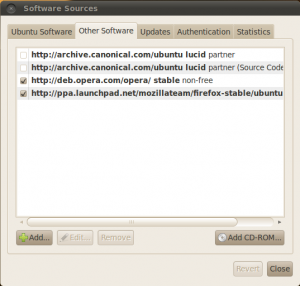Posts Tagged ‘Open source’
Upgrading Firefox 3.6.x to 4.0 on Ubuntu Desktop 10.04
The last few days I’ve been using my Ubuntu desktop 10.04 more and more, which I’m running as a VirtualBox appliance on my Macbook Pro inside of Mac OS X.
Learning the ropes, I’ve stumbled a few times. Luckily, I’ve pretty much figured out how to do everything I needed.
I wanted to upgrade from Firefox 3.6.15 which is what was the latest version of Firefox as part of Ubuntu’s Software Center.
I had run Update Manager before starting and the latest packaged version was Firefox 3.6.15.
To upgrade from 3.6.15 to 4.0, you need to do the following:
Open up the Ubuntu Software Center then Edit > Software Sources and click the ‘Other Software’ tab. Press ‘Add’ and then paste ppa:mozillateam/firefox-stable into the relevant field.
After you click add, you should see the dialog with all of the available software sources as in the diagram below.
After adding the PPA you will be prompted to update your sources. Once this completes, you can go to System > Administration > Update Manager to perform an upgrade.
I found that a couple of my add-ons were not compatible, but Firefox 4.0 only just came out yesterday, so I’ll give it some time.
Installing Opera 11 on Ubuntu 10.04
After setting up my Ubuntu 10.04 desktop through a VirtualBox appliance on my Macbook Pro 15″, I installed a couple of pieces of software through the Ubuntu Software Center which is under the Applications menu item. This consisted of Chromium – Google Chrome browser, VLC player, and Adobe Flash player.
I wanted to test out Opera on Ubuntu, but Opera does not appear in the list of available software.
I found these instructions on the Ubuntu help site, but wanted to clarify them here.
The reason is that I found the instructions at http://deb.opera.com/ to be confusing. Mainly, I didn’t know exactly which apt source I should add.
This assumes a fresh install of Ubuntu 10.04 desktop with all software updated – meaning that you have run the following which updates all software, security updates, and patches that have come out since the VirtualBox appliance image or CD/DVD that you used to install Ubuntu was created. This should be the first thing you do on any Ubuntu server or desktop install.
$ sudo apt-get update $ sudo apt-get upgrade
Add this to the list of software sources:
System\Administration\Software sources, and then click the Other Software Tab and Add
deb http://deb.opera.com/opera/ stable non-free
NOTE: if you prefer to do things on the command line, the GUI menu item for this stores the sources in /etc/apt/sources.list. So you can manually edit that file to add your new source.
Issue this command from a terminal window to add the Opera GPG key
$ wget -qO - http://deb.opera.com/archive.key | sudo apt-key add -
Now that you have the source defined and the GPG key installed, you can install the software with these two commands.
$ sudo apt-get update $ sudo apt-get install opera
Now you can go to the menu and start Opera.
Applications\Internet\Opera
Note, you can also install Opera by downloading it from another browser like you can with Windows or Mac OS X, and then running the downloaded installer.
By installing it through aptitude (sudo apt-get install), it will be upgraded automatically any time there is a newer stable release via Ubuntu’s normal software update mechanism, which by default runs daily. This is the Ubuntu way of doing things.
UPDATE: I found that after I installed this and ran sudo apt-get update or updated the Ubuntu software through Update Manager that I received the following error:
W: GPG error: http://deb.opera.com stable Release: The following signatures couldn't be verified because the public key is not available: NO_PUBKEY A2019EA84E7532C8
I fixed this by running this command which I found at this source
$ gpg --keyserver pgpkeys.mit.edu --recv-key A2019EA84E7532C8
Openoffice.org vs. LibreOffice
I just noticed that there was a new player in town in the desktop office productivity realm with the name LibreOffice.
I was watching a Ubuntu 11 desktop preview video from ZD-Net and noticed that they were referencing the fact that Ubuntu will now come installed with LibreOffice instead of OpenOffice.org.
Low and behold after a bit of research, it seems that key developers of OpenOffice.org are not happy with Oracle’s direction for OpenOffice.org and have defected to a new nonprofit organization called the Document Foundation, which maintains LibreOffice.
In addition to Windows and Mac versions being available, it appears that other Linux software distributors Novell SUSE, Redhat, and Canonical Ubuntu are backing the Document Foundation and LibreOffice as well.
More information here at Infoworld.
This certainly creates a dilemma on which version to use. I think I’ll stick with OpenOffice.org for the time being.
Has anybody tried LibreOffice yet? What are your thoughts?
